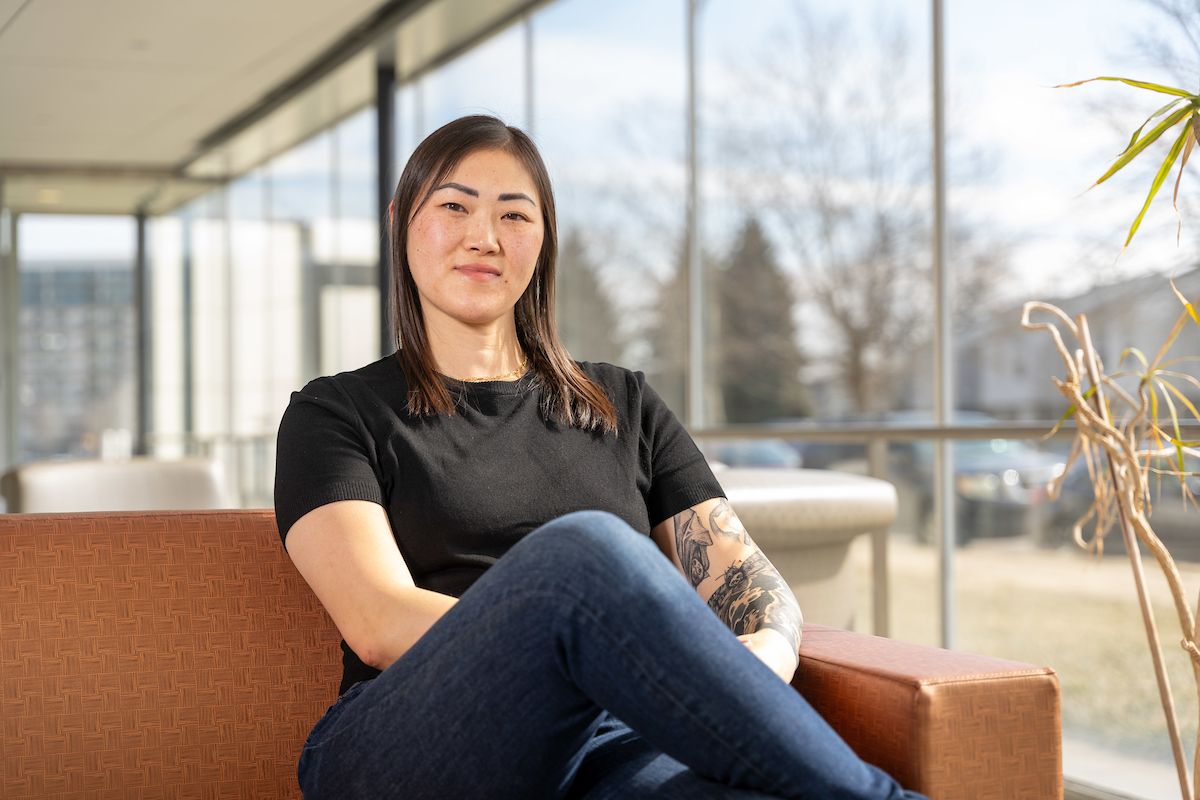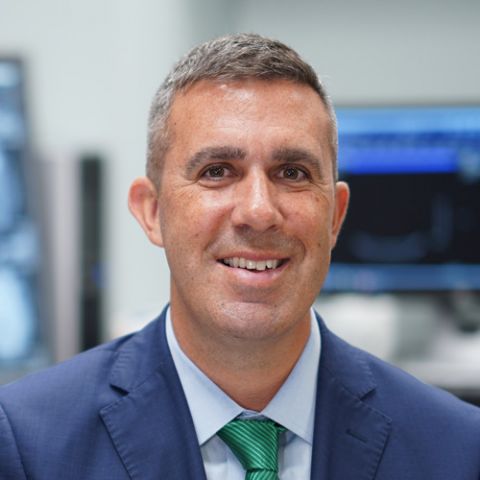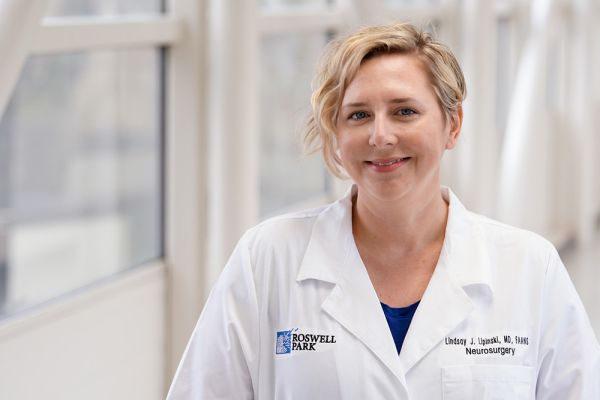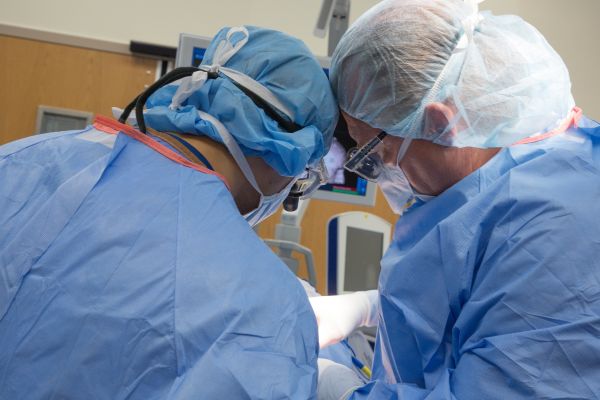Elizabeth Fumia, 38, has some hard-earned advice to share. “You know your body better than anyone else. If you believe something is wrong with your health, be persistent and advocate for yourself until you have a satisfactory answer,” she says.
In 2019, after nearly a year of frustrating appointments with multiple doctors, Elizabeth finally got her satisfactory answer at Roswell Park Comprehensive Cancer Center, where she was diagnosed and treated for a benign pituitary tumor as well as acromegaly, a rare condition in adults, caused by excess growth hormone from the pituitary tumor.
A frustrating search for answers
For six years, Elizabeth knew something was wrong as her body changed, subtly at first and then more dramatically. “My periods became irregular. I began having frequent migraines and headaches. I developed cystic acne on my face and pain in my joints. The shape of my face changed from round to a more narrow and chiseled profile, causing my teeth to shift. And most alarmingly, over a span of five years, I grew three inches taller, my shoe size went from 6 to 8, and my ring size went from 6 to 11.5,” she says.
Elizabeth first went to her primary care doctor, who referred her to various specialists, including a gynecologist, dermatologist, rheumatologist and neurologist. “All of them focused on treating isolated symptoms related to their area of expertise, rather than looking at the whole picture,” she says. “I was told that I might be experiencing perimenopause and aging prematurely, but even after many blood tests and exams, no one could explain why these things were happening.”
Finally, an MRI revealed a suspected tumor on her pituitary gland, a pea-sized gland at the base of the brain, and she was immediately referred to Roswell Park.
Specialized testing provides a definitive diagnosis
Elizabeth’s first appointment with Roswell Park neurosurgeon Andrew Fabiano, MD, MBA, FAANS, was life-changing. “At last, I got some definitive answers,” she says. “Based on the MRI images, Dr. Fabiano confirmed I had a pituitary tumor. He explained that pituitary tumors are almost always benign (non-cancerous) and do not spread to other parts of the body, but they should still be treated because they can cause abnormal secretion of hormones, impair normal hormone function, and press on the brain, sinuses and optic nerve as they grow in the skull.”
As a high-volume comprehensive cancer center, Dr. Fabiano and his fellow board-certified neurosurgeons at Roswell Park treat patients with different types of brain tumors every day and have specialized experience in the causes and treatment of many rare brain-related diseases, including acromegaly.
“I suspected acromegaly caused by the pituitary tumor,” says Dr. Fabiano. “While she had undergone many blood tests in her search for answers, her insulin-like growth factor (IGF-1) level – the preferred blood test to diagnose acromegaly – had never been checked. We ordered an IGF-1 test, which confirmed the acromegaly diagnosis.”
Unfortunately, Elizabeth’s frustrating path to finally getting an accurate diagnosis was not unusual. “The tumor growth and physical changes caused by acromegaly occur slowly, which can lead to a delay in diagnosis,” says Dr. Fabiano. “While these changes may not be noticed from day to day, when patients look back at photographs of themselves over time, the dramatic changes in their physical appearance are very apparent.”
Pituitary tumors need specialized endonasal surgery
Elizabeth underwent endoscopic endonasal surgery to remove her tumor. This complex operation required the expertise of both Dr. Fabiano and head and neck surgeon Ryan McSpadden, MD. An endoscope — a thin, lighted telescope with a camera on one end — is inserted through one of the patient’s nostrils, and the camera sends images from inside the head to a monitor. The surgeon operates through the other nostril, creating a channel from the nose and sinuses to the skull base. Then the neurosurgeon removes the tumor, using similar techniques.
“I was able to go home soon after the procedure, but it took me a while to recover,” Elizabeth recalls. “I had a bad headache. The first month especially, I was exhausted, off-balance and had trouble with mental focus, so I couldn’t drive, be alone, manage stairs or do things around the house. I was lucky to have my parents and in-laws take turns staying with me during that time. By the second month, I was less fatigued, and Dr. Fabiano said I could start to do light exercise. By the third month, I finally felt healthy enough to return to my job as a psychotherapist and mental health counselor.”
Treating pituitary tumors
You need specialized care when cancer affects your endocrine system. Roswell Park provides comprehensive diagnostic and treatment services to patients with benign or malignant tumors and conditions affecting the endocrine system, including pituitary tumors.
Gamma Knife radiosurgery completed tumor removal
Four months after endonasal surgery, Elizabeth underwent Gamma Knife radiosurgery to eliminate a remaining portion of the tumor. “In most cases, a pituitary tumor can be completely eliminated during endonasal surgery. However, in Elizabeth’s case, a portion of the tumor was in a large vein in the brain, and the safest way to eradicate that last section of the tumor was with Gamma Knife radiosurgery,” says Dr. Fabiano. The Gamma Knife is not actually a knife, and it doesn't involve cutting or incisions.
Rather, it is a form of focused, high-precision radiation therapy that targets the brain tumor with intersecting gamma rays. It does not require general anesthesia and is usually done as an outpatient procedure. Roswell Park is the only Western New York facility that performs Gamma Knife and, since the program's launch in 1998, has performed the advanced radiosurgery on more than 12,000 patients from across the country and around the globe. “It took only a few days to feel better after the Gamma Knife procedure,” Elizabeth says, “Additionally, I took a synthetic hormone that inhibits the release of human growth hormone – for six months, when my IGF-1 levels were finally within a normal range.”
Recovery and remission, at last
Now in complete remission for five years, Elizabeth is in the maintenance phase of treatment. “I will have exams, MRIs and bloodwork annually at Roswell Park for the next five years to monitor my growth hormone level. Right now, I feel great. My lab work is perfect. There are no traces of any tumor growth, and my acromegaly is gone. Although Dr. Fabiano says I will not go back to my original height, my shoe size and ring size are now closer to their original size, and while my estrogen levels are closer to ‘normal,’ I am now considered to be in perimenopause.”
Looking back, Elizabeth is grateful for the treatment she received at Roswell Park and is committed to helping Roswell Park continue to help others. “I love bike riding and spinning, and with my health back on track, I’ve been able to participate in fundraisers for Roswell Park, including the Ride for Roswell and IceCycle,” she says. “I will continue to encourage others to trust their instincts, ask questions and be persistent when it comes to advocating for their health.”
Editor’s Note: Cancer patient outcomes and experiences may vary, even for those with the same type of cancer. An individual patient’s story should not be used as a prediction of how another patient will respond to treatment. Roswell Park is transparent about the survival rates of our patients as compared to national standards, and provides this information, when available, within the cancer type sections of this website.






